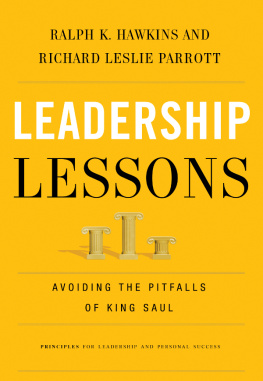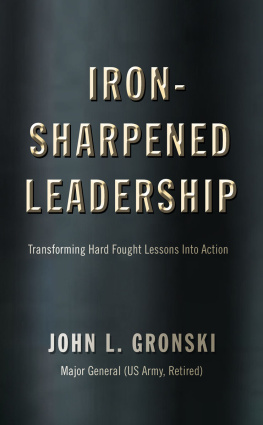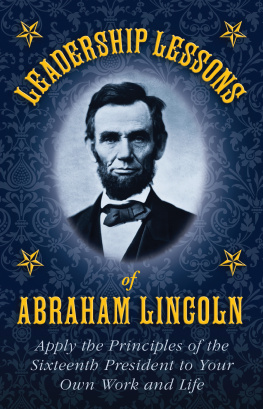LEADERSHIP
LESSONS
2013 by Ralph K. Hawkins and Richard Leslie Parrott
All rights reserved. No portion of this book may be reproduced, stored in a retrieval system, or transmitted in any form or by any meanselectronic, mechanical, photocopy, recording, scanning, or otherexcept for brief quotations in critical reviews or articles, without the prior written permission of the publisher.
Published in Nashville, Tennessee, by Thomas Nelson. Thomas Nelson is a registered trademark of Thomas Nelson, Inc.
Thomas Nelson, Inc., titles may be purchased in bulk for educational, business, fund-raising, or sales promotional use. For information, please e-mail SpecialMarkets@ThomasNelson.com.
Unless otherwise noted, Scripture quotations are taken from the Holy Bible, New International Version, NIV. Copyright 1973, 1978, 1984, by Biblica, Inc. Used by permission of Zondervan. All rights reserved worldwide. www.zondervan.com
Scripture quotations marked NRSV are from the NEW REVISED STANDARD VERSION of the Bible. 1989 by the Division of Christian Education of the National Council of the Churches of Christ in the U.S.A. All rights reserved.
Scripture quotations marked RSV are from the REVISED STANDARD VERSION of the Bible. 1946, 1952, 1971, 1973 by the Division of Christian Education of the National Council of the Churches of Christ in the U.S.A. Used by permission.
Scripture quotations marked NLT are from the Holy Bible, New Living Translation. 1996. Used by permission of Tyndale House Publishers, Inc., Wheaton, Illinois 60189. All rights reserved.
Scripture quotations marked NKJV are from the New King James Version. 1982 by Thomas Nelson, Inc. Used by permission. All rights reserved.
Scripture texts marked NAB are taken from the New American Bible, revised edition 2010, 1991, 1986, 1970 Confraternity of Christian Doctrine, Washington, D.C. and are used by permission of the copyright owner. All rights reserved. No part of the New American Bible may be reproduced in any form without permission in writing from the copyright owner.
Scripture quotations marked NJB are from The New Jerusalem Bible, copyright 1985 by Darton, Longman & Todd, Ltd. and Doubleday, a division of Random House, Inc. Reprinted by Permission.
ISBN: 978-1-4016-7728-2
Printed in the United States of America
13 14 15 16 17 18 RRD 6 5 4 3 2 1
Ralph K. Hawkins
To my leadership heroes...
Mike and Judy Beatty
Jimmy and Kay Shirer
Jerry and Peggy Boggus
Dexter and Birdie Yeager
Richard Leslie Parrott
To the members of my Sunday school class, the Koinonia class. Each week we gather to study the Scripture and encourage one another as we live, love, and learn together with the same mindset as Christ Jesus (Phil. 2:5).
Contents

W hat kind of leader blows up and throws a spear at one of his most trusted commanders? What kind of leader attempts to kill his own son, his designated successor, in the middle of a conference? What kind of leader customarily sits with his back to the wall so that he cannot be taken by surprise? What kind of leader slaughters the inhabitants of an entire town because they have harbored someone whom he perceives to be threatening his leadership? What kind of leader would do these terrible things, and more? Believe it or not, the leader who did these things is a biblical character, and one anointed by the famous prophet Samuel as Israels first kingSaul of Kish.
Do these foibles sound extreme? Are they so far removed from present-day concerns as to be irrelevant? We do not think so, as our own encounters with problematic leaders both in church and in business seem to verify:
a church leader works against the pastor and other staff, seeking to divide the church because he cannot get his way;
a pastor seeks to impose his agenda on the church, regardless of how many people protest the changes;
the manager of a retail store secretly wears merchandise home without paying for it;
a department head threatens and cajoles those under his supervision.
Each of these examples involves men and women who may indeed be basically good and honest people, but who, like most leaders, struggle with shortcomings in their leadership.
When seen in perspective, many of Sauls foibles are not so exceptional. Leaders everywhere struggle with the tendency toward manipulation of others, the utilization of spin, inappropriate behavior, and self-promotion. In Leadership Lessons: Avoiding the Pitfalls of King Saul, leaders will have the opportunity to lay bare the life of a basically good and honest person to see the ways he struggled to live and lead with integrity, and learn from the times when he succeeded in that endeavoras well as from the times in which he failed.
Leadership booksboth in general and business categorieshave traditionally focused on best practices, while our concentration will be on seeking to learn from someone elses shortcomings. Our approach of using the worst practices of a historical figure in order to teach positive leadership habits may seem unusual to some, though it is actually an emerging trend in leadership studies. When Sydney Finkelstein, a professor at Dartmouth Colleges Tuck School of Business, began to teach management by focusing on worst practices, his students were skeptical. He offered Learning from Corporate Mistakes as an elective and, ultimately, the class became so popular that Tuck reworked its MBA program with this class as a required first-year course. Abandoning traditional management offerings, Finkelstein has raised eyebrows with his unconventional research. Students, however, have responded extremely well, and appreciate the profundity of real-life examples of leadership failures. Finkelstein published his findings in 2003 in Why Smart Executives Fail: And What You Can Learn from Their Mistakes, and the book has become a leadership classic.
While it may seem counterintuitive to focus on worst practices, this approach is essentially saying: Here is how people messed up. Dont do what they did. Everyone has heard the old adage, Its good to learn from our failures, but its an even better thing to learn from someone elses failures. This approach makes perfect sense; what could be more valuable than learning from someone elses failures? Professor Finkelstein, author of Why Smart Executives Fail, went on to create a management tool, in conjunction with Jackson Leadership Systems, called the SMART Early Warning System, that company boards and senior executives can use to identify the leading indicators that Finkelsteins research found to be predictors of trouble down the line. This tool provides a specific
In recent years, several authors have begun to explore bad leadership and leadership failures. Among the first to take an interest in this topic were Gary McIntosh and Samuel Rima, whose 1997 book, Overcoming the Dark Side of Leadership, was essentially a response to the very public moral and ethical failures of a number of prominent church and parachurch leaders in the last two decades of the twentieth century. which is full of examples of failure, as well as advice on how to recover from mistakes and regain ones leadership footing. The study of leadership failure is a burgeoning field, and these are just a few of the books available on the subject.
This is the approach we take in Leadership Lessons: Avoiding the Pitfalls of King Saul













